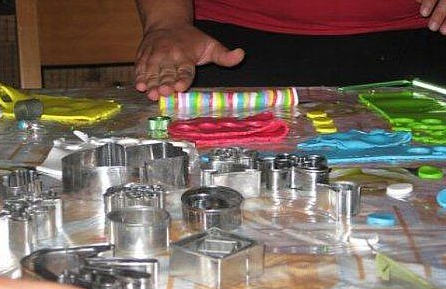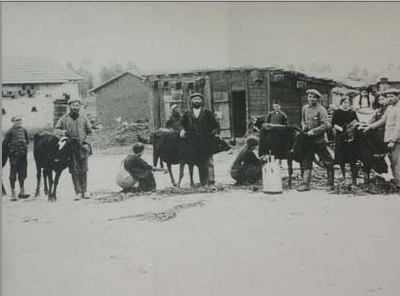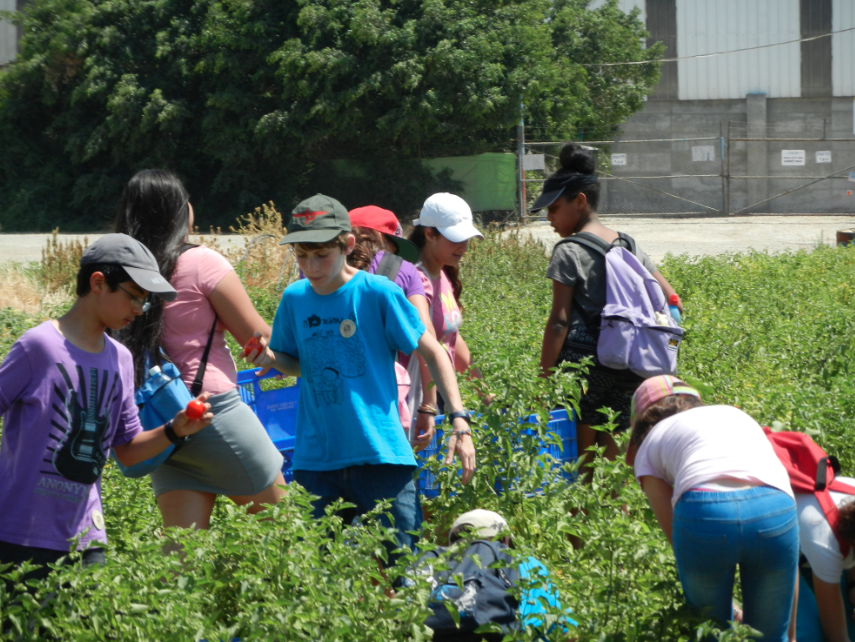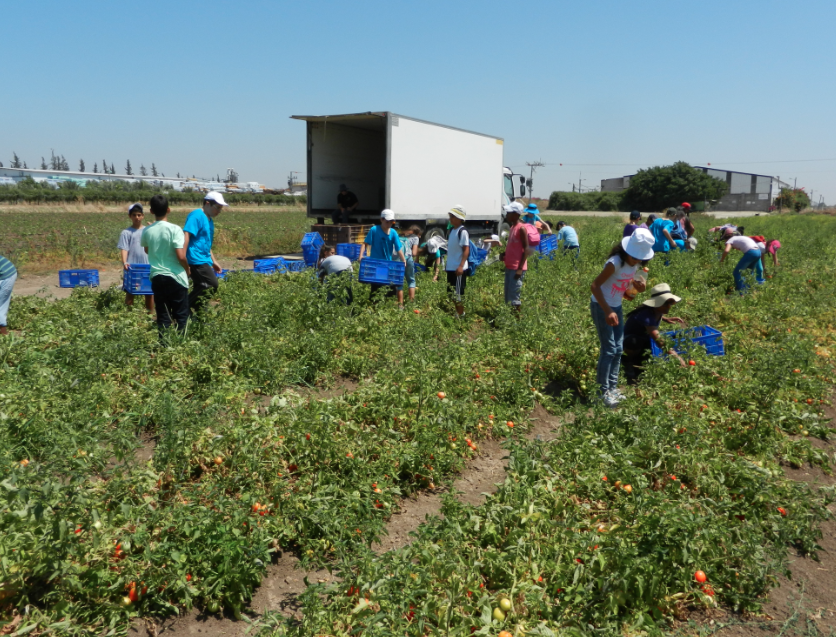My theory is that if you go to a tribe of Masai warriors or Inuti hunters, you will find that it’s always the same individuals who volonteer to organize things. It starts in grade-school, and it follows you all through your life. Some people are like that, they get roped in. This week I was asked if I want to join a volonteer organization that works with families of drug-users. It’s a worthy cause and they do excellent work, but I actually said no. I made a promise to myself not to take on any more volunteer activities. I spend way to much ime on volonteer projects and way too little working.
 The mainstream job I would least like to do is teach elementary school. And junior high-school. And high-school. Large groups of children terrify me. So I can’t explain how I happened to organize a class-trip for one of the last days of school for my youngest daughter. The parents committee in each of the three parallel classes was supposed to put together something fun and not costly for their kids to do. Although I’m not on the committee any longer, I had an idea. That’s when all the trouble starts. Somebody once had an idea that led to World War II. Mine wasn’t that bad. I thought we’d take the kids to volonteer for a few hours and end with a picnic.
The mainstream job I would least like to do is teach elementary school. And junior high-school. And high-school. Large groups of children terrify me. So I can’t explain how I happened to organize a class-trip for one of the last days of school for my youngest daughter. The parents committee in each of the three parallel classes was supposed to put together something fun and not costly for their kids to do. Although I’m not on the committee any longer, I had an idea. That’s when all the trouble starts. Somebody once had an idea that led to World War II. Mine wasn’t that bad. I thought we’d take the kids to volonteer for a few hours and end with a picnic.
Recently I visited an organization named Shekel, who provide community services for people with special needs. Among many other activities, Shekel have special production facilities for gifts, hand-made by mentally disabled people. It’s really nice, there are different groups working on different projects, which are then sold to the general public. Shekel has a gift shop where they sell their products, staffed by disabled workers. They also offer tours of their facilities, including a short movie made by the “kids” (they are not kids, but I couldn’t find a more appropriate term). And then you can volonteer and work with them in the work-shop for a few hours. So that’s what I wanted to take the sixth-graders to do. Except we were way too many, they could only take a group of about 10 normative kids. By then, it had kind of become my problem to come up with an alternative idea. So this is what we did. We took a busride to Mazkeret Batya, (don’t worry if you’ve never heard of it, neither has anybody else) about an hour away from Jerusalem.
 This small place, built in the 1870’s by Jewish immigrants from Russia is now being reconstructed so that one can see what daily life for the farming community looked like back then. The local museum had promised a treasur-hunt through the picturesque streets of Mazkeret Batya, but I don’t think they have a deep understanding of how that is supposed to work. What we got, in fact, was a guided tour through the museum and some of the sights while carrying a sheet of paper in our hands. Once in a while the guide would say “and that is clue number 7”. Lame. The tour itself though was really interesting, and the high-light, the local well which still works, was a treat. (foto)
This small place, built in the 1870’s by Jewish immigrants from Russia is now being reconstructed so that one can see what daily life for the farming community looked like back then. The local museum had promised a treasur-hunt through the picturesque streets of Mazkeret Batya, but I don’t think they have a deep understanding of how that is supposed to work. What we got, in fact, was a guided tour through the museum and some of the sights while carrying a sheet of paper in our hands. Once in a while the guide would say “and that is clue number 7”. Lame. The tour itself though was really interesting, and the high-light, the local well which still works, was a treat. (foto)
And once again I’m deeply grateful for being born in this time and place, where life is so easy. How difficult the lives of particularly the women of that generation must have been. You see the elaborate lace tablecloths, which not only were hand-made, but also had to be washed and ironed without the benefit of any of our modern equipment. Phu.
But what I really wanted to tell you about was the second half of the day. We did take the kids to volonteer. Another of those amazing volonteer organizations is Leket. They collect food for needy people. One of their projects is picking up food from restaurants and banquet halls at the end of the work-day, and bringing it to soup-kitchens and other meeting-places of people in need. Some of the needy are simply poor; others do not have the skills or the strength to organize what they need in their lives. Israel is a country of immigrants, and immigration always takes its toll. Often, people leave a bad situation to make a better future for their kids. But they themselves will always find life in a new country a struggle.
 What we did is another of Lekets projects, picking leftover vegetables and fruits. The organization gets permission from farmers who have finished harvesting to bring volonteers to their fields to pick what was left behind. Commercial farming only spends an economically viable time on each field, and once they are done, there may still be quite a lot of produce left. We got to pick tomatoes, which was absolutely wonderful. The day we went was very hot and so were the tomatoes. It’s a wonderful feeling picking up a smooth, red tomato. The bushes, which at some point must have been laden with tomatoes, now lay down on the ground. If you lifted a branch, you would suddenly see a whole bunch of bright red tomatoes snuggeling together on the ground, warm to the touch.
What we did is another of Lekets projects, picking leftover vegetables and fruits. The organization gets permission from farmers who have finished harvesting to bring volonteers to their fields to pick what was left behind. Commercial farming only spends an economically viable time on each field, and once they are done, there may still be quite a lot of produce left. We got to pick tomatoes, which was absolutely wonderful. The day we went was very hot and so were the tomatoes. It’s a wonderful feeling picking up a smooth, red tomato. The bushes, which at some point must have been laden with tomatoes, now lay down on the ground. If you lifted a branch, you would suddenly see a whole bunch of bright red tomatoes snuggeling together on the ground, warm to the touch.
They were delicious and we were allowed to eat as much as we wanted. The kids took their mission very seriously, knowing that what they picked would be delivered to those in need the following day. A few kids, who had been really uniterested at the first stop, surprised me by suddenly working with total concentration. To some of our city-slickers it may have come as quite a surprise that tomatoes don’t grow in the supermarket. In a little over an hour, we picked 350 kilos and it felt like a wonderful accomplishment. The rowdiest kid of all, who had been a case-study of why I don’t want to be a teacher, didn’t want to go home. She was fascinated by the idea that she was doing this for someone else and she kept saying “just a few more”. In the end I had to use my “could have been a teacher” voice to get her to leave.
After a day with a school-class, I’m less inclined than ever to want to teach. But I still want to volonteer.
Noomi Stahl


